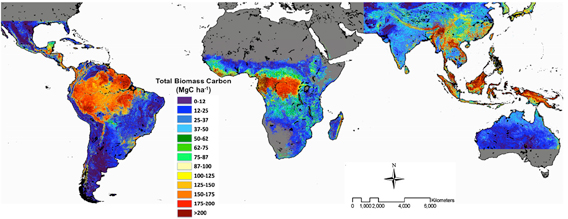2.5-billion-ha carbon map shows forests store 250B tons of carbon

Tropical forests across Latin America, Africa, and Southeast Asia stored 247 gigatons of carbon — more than 30 years' worth of current emissions from fossil fuels use — in the early 2000s, according to a comprehensive assessment of the world's carbon stocks.
The research, published in the journal Proceedings of the National Academy of Sciences by an international team of scientists, used data from 4,079 plot sites around the world and satellite-based measurements to estimate that forests store 193 billion tons of carbon in their vegetation and 54 billion tons in their roots structure. The study has produced a carbon map for 2.5 billion ha (6.2 billion acres) of forests.
According to the study, forests in Latin America account for 49 percent of the total carbon stock, followed by forests of Southeast Asia (26 percent), and Africa (25 percent). Brazil's forests accounted for nearly a quarter of total biomass measured in the study. Democratic Republic of Congo (9.8 percent), Indonesia (9.3 percent), Peru (4.9 percent), and Colombia (4.1 percent) rounded out the top five countries, which together accounted for more than half (52.8 percent) of tropical forest biomass.
Read the full article here: http://news.mongabay.com/2011/0531-carbon_map.html?utm_campaign=General+news
Partido Kalikasan Commentary:
This carbon stocks global map will indeed pave way for moving the agreements on the REDD (Reduced Emission in Deforestation and Forest Degradation) as it will definitely provide a benchmark to measure reduction of greenhouse gas emission due to forest loss. The idea being that more industrialized countries who are the real culprits of climate change due to their past and ongoing rate of greenhouse gas emission must compensate developing countries for protecting, maintaining and improving their forest as carbon sinks.
Partido Kalikasan has no problem with the idea of compensation for the carbon sinks conserve and preserve. Our problem lies when such "payments" of industrialized countries become substitute for reducing their own level of greenhouse gas emission. Not only does it not promote the necessary lifestyle and systemic changes in the overly-consuming and wasteful societies and cultures of these industrialized countries -- rooted in greed and is the negative value that causes the current climactic, food and water crises that we have today --; it also limits the level of development; including sustainable utilization of our own resources that less industrialize countries have the right-to-development for.
In Filipino culture, we have a term for this equitable principle -- SAPAT. Literally it means the middle way. For those who have more, some should be taken away and distributed or PAID to others who have less. For those who have less, more should be given so that they reach a level of wellness commensurate to their human dignity and the dignity of mother earth.

No comments:
Post a Comment